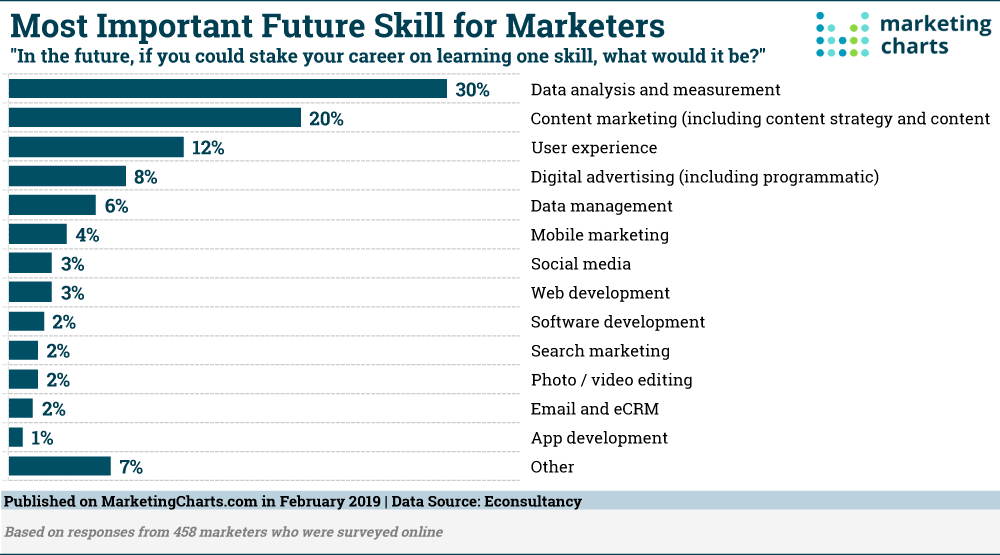

How important is content marketing to the future success of a business?
It turns out that one fifth of respondents to a recent survey feel that content marketing is the most important skill for marketers in the future (this was only surpassed by data analysis and measurement). While advertising did make the list, it was mostly related to digital advertising. In fact, most of the listed skills were heavy into digital and data. Technology is making the marketing industry change, and marketers are recognizing the needs to amp up their skills (both today for tomorrow). That’s the main piece of news from the Marketing Charts article, What Skills Would Marketers Stake Their Future On? This does not discount the soft skills (no need to panic!):
“Even with an emphasis being placed on more technical and data-driven skills, more human-centric skills such as the ability to embrace change, critical thinking, lateral thinking and collaboration are still considered essential for marketers. In fact, nearly all (93.9%) of the survey’s respondents felt that these so-called soft skills were just as important as technical skills for a successful career in marketing. The ability to embrace change is considered to be a very important skill for a successful marketing career by 7 in 10 respondents. The importance of this skill appears to be consistent, with a similar study by Econsultancy from five years ago revealing that three-quarters (75%) of marketers felt that the ability to embrace change was very important.”
In the crazy world of innovation and disruption in marketing, content marketing still made it to the second position?
This makes perfect sense. Brands need new and innovative ways to tell their story to a marketplace that is growing more immune to traditional advertising. Consumers don’t like being interrupted. Consumers have become much more adept at removing advertising from their lives. More than that, content marketing allows brands to connect in broader ways. It enables them to dive deep with those who are most interested. It enables them to be present in spaces that they could not traditionally occupy. Brands that tell good stories get incredible results. Text, images, audio and (especially) video stories can be created and distributed through both paid and free channels to a global marketplace that seems hungry (and hungrier) for compelling stories. Brands can be the centrepiece of this content or can support it (through sponsorship or association). In fact, one could argue that content marketing just made the marketer’s toolbox double in size (with a bunch of new tools to go along with it). In simpler terms, it feels like content marketing is the perfect place for brands to seek refuge from advertising. The advertising landscape’s scarcity model has all but disappeared, the digital duopoly that is Google and Facebook is getting much more crowded (with prices rising and no clear indication that any of this is creating a better consumer experience). So, if a brand has to gamble, the odds are getting better for them to do it on their own terms, with their own stories and on their own platforms. Content marketing can absorb some of the pain that advertising still creates.
Content marketing is just getting started.
While there is decades worth of great content marketing stories to be told, digital changes everything. Now, as video and personalization gets better and better, it seems like the time is ripe for the major transition to take place. Advertising was the eight hundred pound gorilla of communications in marketing for decades. If we are to believe the respondents in in this Econsultancy survey, this media shift is now trickling down to the marketing practitioners, who are suddenly being thrusted into the awkward position of not just being smart within the context of thirty second spots, but having to figure out a real storyline (and how to deliver against it) for the brand is a consistent and ongoing manner. That is no small feat… and that’s why content marketing’s surprising placement as the second most important skill for a marketer’s future should come as no surprise. The best storytellers probably want no part of the marketing industry, and now that same industry is in dire need of this exact expertise. What senior leadership might not understand is this: content marketing is not advertising. They are two very different skill sets that require two very different approaches. The problem, of course, is that every brand will think that the same people can handle the same jobs. So, if consumers thought that the quality of ads have gotten worse (or were never all that great to begin with), just wait and see how the growth of content marketing gets handled. Let’s avoid this tragedy in waiting. Let’s embrace this opportunity. Let’s be thankful. Brands can (and should) tell better and braver stories. Brands can finally have these real interactions with real human beings. Consumers are open and engaged with quality content. All of the time.
What an incredible story. Content marketing tops data management, email marketing, CRM and much more. Let’s go and tell some great stories!
Episode #977 of Six Pixels of Separation - The ThinkersOne Podcast is now live and…
Welcome to episode #977 of Six Pixels of Separation - The ThinkersOne Podcast. Dan Heath…
Is there one link, story, picture or thought that you saw online this week that…
My brain is broken. I realized this a few months back.In trying to be informed…
Episode #976 of Six Pixels of Separation - The ThinkersOne Podcast is now live and…
Welcome to episode #976 of Six Pixels of Separation - The ThinkersOne Podcast. Jennifer Moss…
This website uses cookies.